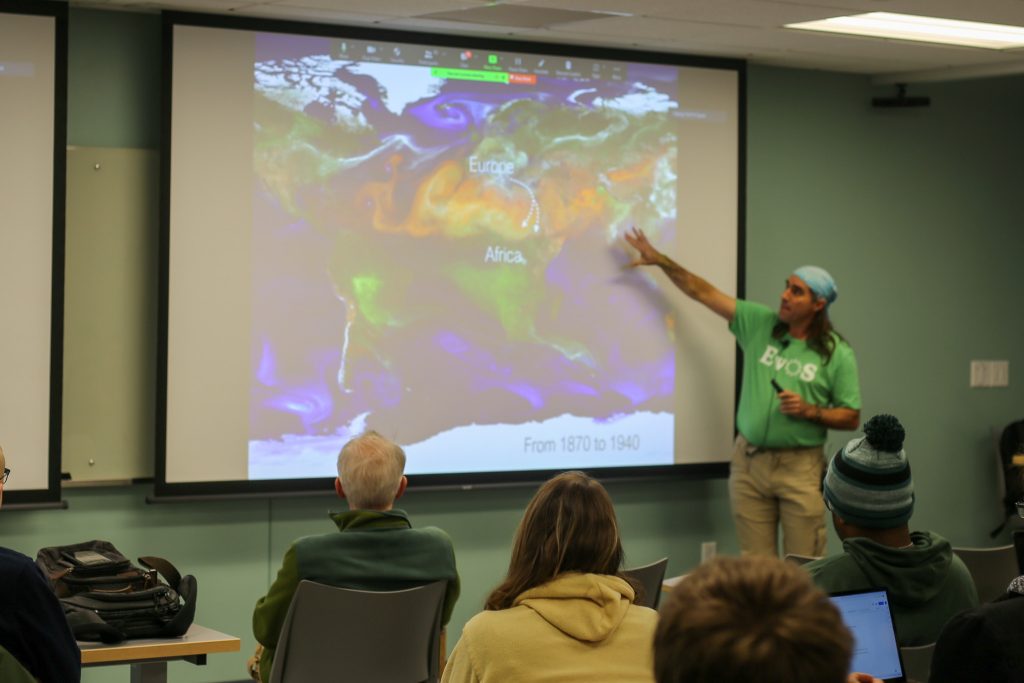On Monday, the department of evolutionary studies (EvoS) held a seminar about restoring natural landscapes on a broad scale.
The discussion — titled “Cultural Evolution for the Regeneration of Earth” — was hosted by Joseph Brewer, the founder of Earth Regenerators, a company seeking to restore ecosystems through a network of projects. According to Brewer, he and his team work to revitalize ecosystems through a series of hands-on projects and a study group, as well as educational activities for children to encourage them to be more connected to the natural landscapes around them.
During the seminar, Brewer emphasized the importance of viewing environmental issues on a planetary level, rather than working within geographic or project boundaries.
“When I realized that there were all these different levels and that no one was able to get to the planetary scale, it became apparent to me that it wasn’t about doing it at any one level,” Brewer said. “What actually matters is to understand the interactions between the levels. If we can understand the interactions between the levels, then we might find our way to a systemic pathway into the holistic health of each part, all the way up to the whole.”
Due to the complex web of interdependencies that interact on this planet, Brewer explained that attempting to solve part of the problem may cause issues elsewhere. Organizing landscapes into natural boundaries such as watersheds, could solve issues with organizing on a large scale, according to Brewer.
“It’s interesting to notice that every place has power to it,” Brewer said. “If you look at something as large as the African continent, with 55 nation-states, it’s huge — you can’t even imagine how big it is. But then if you look at the way that water organizes itself across the land, you see that there are 400 rivers.”
Several of Earth Regenerator’s on-ground projects involve restoring watersheds through digging retention ponds and regenerating rivers, as explained by Brewer. Other projects, including planting trees and restoring forests, building regenerative farms and creating teaching spaces for children to teach nature connections.
Brewer explained that the main goal of Earth Regenerators is to create a system of projects such as these with the goal of revitalizing entire ecosystems.
“The earth is filled with beautiful places,” Brewer said. “What we’re doing is we’re working to create a design school that can heal the entire landscape.”
In addition to the seminar series, the EvoS program website states that they offer classes in anthropology, biology, psychology and environmental science. Future seminar topics listed on the website include “Human Evolution in Africa: Evidence from the Central Highlands of Kenya” and “International Ocean Discover Program Expedition 371: How tiny fossils can answer large questions about our Earth system.”
Lukas Shriver, a senior majoring in biology, described how the discussion related to some of the readings he did for the seminar class.
“It made me think about cultural evolution differently,” Shriver said. “I never really thought about it as a process similar to genetic evolution. I thought of them as completely different processes, but seeing how they are intrinsically related was interesting to me, because learned behaviors really are like genetic traits that can be traced, and I think that’s so cool.”
Seminars are held on Mondays from 5:15 p.m. to 7:15 p.m. and are open to the campus and local community, according to the EvoS web page. Some will be held on Zoom, while others are held in person in the Science II, room 259.
Connor Celeste, a senior majoring in integrative neuroscience, said that a major takeaway of his was about attitudes around hope.
“The biggest part for me was realizing that there were actually communities who are thinking about global economic change,” Celeste said. “There was also this talk about hope, and talking about how sometimes you can’t necessarily have hope. Sometimes there are hopeless moments, and you have to still keep doing what you think is the right thing.”



